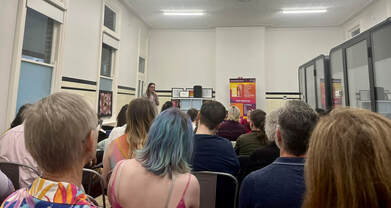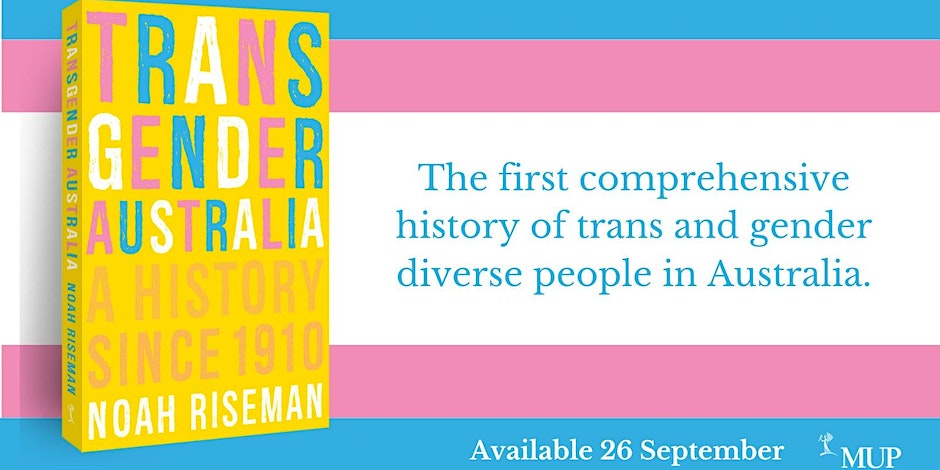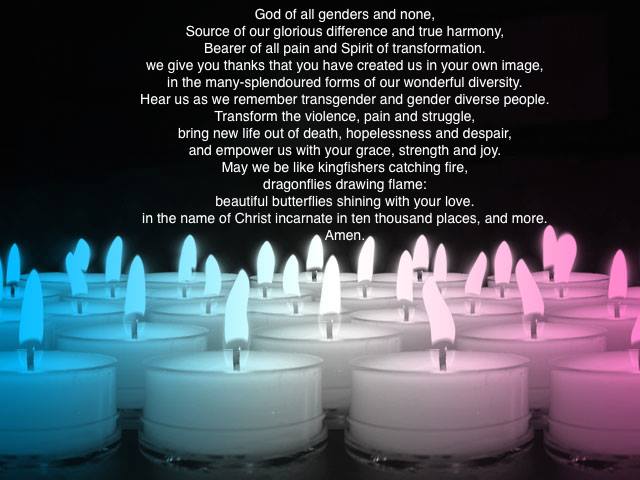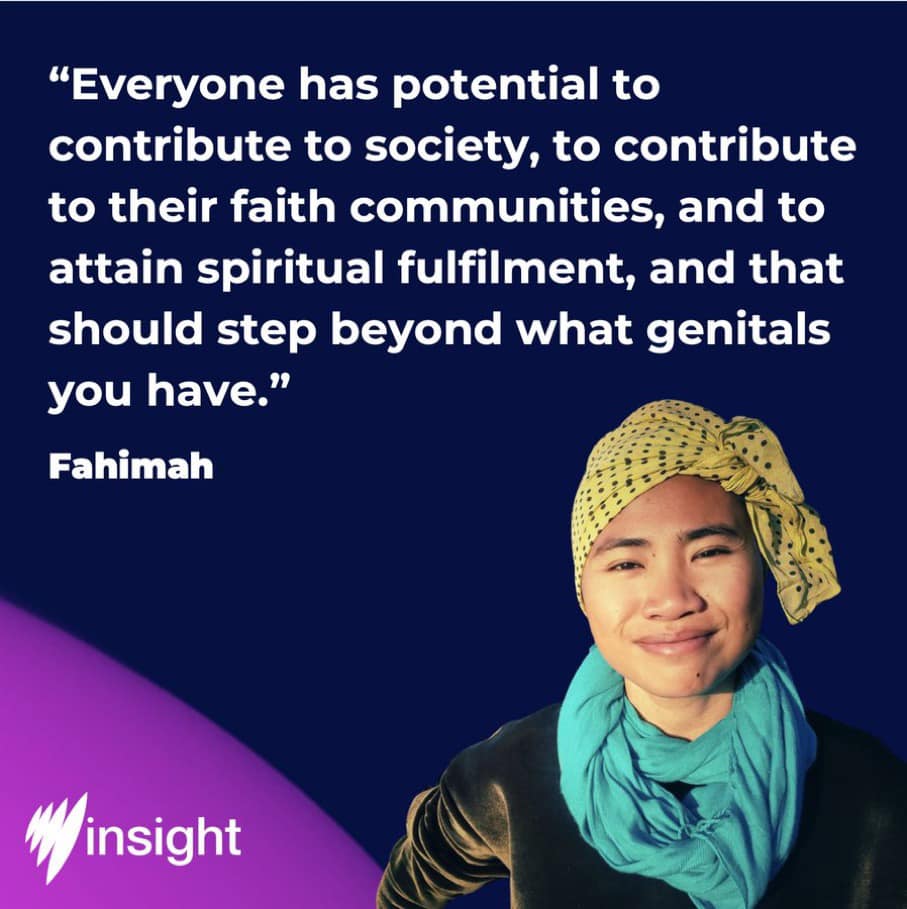 Thanks to everyone involved this evening in the Sydney launch of Transgender Australia: A History Since 1910 - not least Eloise Brook from the Gender Centre, Chantell Martin, former co-CEO of SWOP, and the one and only Norrie :-) It was a lovely evening, including being a delight to see Noah Riseman again. The first book to showcase over a century of Australia’s trans history, Noah's book draws on over 100 oral history interviews and extensive archival research, and explores the changing social, legal, medical and living histories of trans people across all walks of Australian life.
0 Comments
 Firstly I acknowledge the Wurundjeri people as the traditional owners of this place, their elders past and present, and all First Nations peoples here today. I also particularly give thanks for this gathering to Garry Deverell, who, like my fellow speakers, so ‘gets’ where trans people are coming from and the urgent need for stronger intersectionality for love and justice. The great Black feminist lesbian writer and activist Audre Lorde, put it well: ‘there is no such thing as a single-issue struggle, because we do not live single-issue lives.’[1] Therefore, ‘we share a common interest… you do not have to be me in order for us to fight alongside one another. I do not have to be you to recognise that our wars are the same. What we must do is commit ourselves to some future that can include each other and to work toward that future with the particular strengths of our individual identities.’ In the run up to Sydney WorldPride, SBS On Demand 'The Feed' were kind enough to produce a short feature on my wife Penny Jones and I,, which we hope may help and encourage others.
Last year had some amazing highs, but I had some trying health and other struggles at times, and it is always hard to write in a vital congregational placement (especially with the demands of my pioneering ministry) so I'm very grateful for the encouragement and patience of Elenie Poulos and Kate Gleeson (co-editors) in enabling me to contribute an article to a small collection of essays on 'Religion and Politics after marriage equality: contemporary challenges in religious freedom'. My essay (which can be accessed here), built out of the tough experience of some of us, focuses on the marginalisation of transgender people and queer people of faith in queer activism and mainstream Australian churches during and after the Australian marriage-equality plebiscite. I entitled it: 'Climbing out from being thrown under the bus: queer faith futures in a transphobic political world'...
How do you regard dragonflies? In one of his great poems (As Kingfishers Catch Fire), the poet Gerard Manley Hopkins not only encourages us to be like them, but, in so doing, to be like Christ. Not everyone has always agreed however. In early colonial Australia for example, white fellas tried to kill dragonflies, just as they/we tried to kill so many other life-giving things that they/we did not understand. Those early colonialists saw dragonflies flying around and landing on their valuable horses, and they saw the horses moving and flicking their tails. So they thought the dragonflies were biting and making them crook. The colonialists were making things worse. The dragonflies were actually eating the mosquitoes and the gnats that were troubling the horses. They were life-givers, saviours even, not devils in disguise. In so many positive ways, dragonflies are thus evocative symbols for transgender people today. For, on this Transgender Day of Remembrance, we do well to attend to how bearers of light have been treated as embodiments of darkness. We do well, as our Gospel today (Luke 23.32-43) reminds us, to remember how Jesus was not crucified alone, and how others are also crucified today. And above all, we do well to affirm that it is only in recognising the light, in strange places, that we find salvation and hope for us all…
Recently I was part of SBS Insight's program on what is happening to faith in Australia (link here). It was moving, and sometimes challenging, to hear of the pain and disillusionment so many now feel - and with which I also identify. When will faith bodies wake up as a whole and share the human dignity others offer? It was lovely to share some good news, and sit next to a beautiful friend from Muslim Collective who puts it so well..
One day I hope Australian Churches (and all elsewhere) will actively celebrate, support and promote gender diverse people - essentially passive, patchy ‘inclusion’ is so not good enough (as the UCA and the best parts of the ACA really should know by now). In the meantime, I encourage those who will, and can, to use the resources trans and other gender diverse people are producing - and personally, for the upcoming Trans Day of Remembrance this year (a Sunday - so no excuses church folk - 20 November) this year, I offer two new hymns (to well known traditional tunes) and a couple of the prayers I’ve created in the past
(a few more bits too here) - but hey, this is an opportunity to talk to trans and gender diverse folk and do the work of catching up with our gifts and genius, including so much that is life-giving in published form - Tina Beardsley, Austen Hartke, Shay (Shannon) Kearns, Rachael Mann, J Mase III, just to name a few for a start. Celebration and solidarity with trans people is part of the transformation and liberation of us all :-)  I continue to be flabbergasted (that’s the polite way of putting it) by the attempts of Churches to ‘apologise’ to LGBTIQ+ people whilst continuing to ignore our voices, maintaining shame, and hurting us afresh. The latest astonishing ‘apology’ is by the General Synod of the Anglican Church in Australia - actually ’deploring’ activity which it had itself just demonstrated. NO - this kind of ‘apology’ is not acceptable and represents a mockery of the deep understanding of costly repentance and reconciliation in the Christian tradition. Meanwhile, the Uniting Church - with more credibility but with significant holes in its LGBTIQ+ ‘inclusion’, including a current low level of trans awareness and engagement - has also been pursuing an apology process. This is a much better concept but one in which no transgender people have been included in the ‘apology’ group! (so there’s a first apology to make) A few obvious starters therefore for such ventures: * ‘Nothing about us without us’ * Cheap grace betrays the Gospel * Reparations matter In this recent HORIZONS conversation, it was lovely to discuss the invitation to explore the 'trans-ing' of theology and life, with Dr Cathryn McKinney and others from the Australian Collaborators in Feminist Theologies. My brief introductory reflection to this can be found here. With thanks to the terrific Fr Peter Maher, it was good yesterday to share in our national Equal Voices' welcome of Pope Francis' support for 'same sex' civil unions (see our media release below, and here) - in itself a very small step of LGBTIQ+ affirmation, but historically highly significant and very important within the largest and most powerful Church in the world's largest religion. It is also a small ray of light in the face of reaction (not least recently in the Anglican Church of Australia).
I have to say however that I do remain quite frustrated, not only by the slowness of fuller Christian affirmations, but also by the continued use of the outdated binary term 'same sex' - which has been unhelpfully extended by many (like the leading Anglican Australian bishop aka Primate) to cover relationships like my own 'same gender' marriage. Trans and non binary relationships need to be recognised properly, not just lumped in with binary 'same sex', whilst transphobia is at stake in religious limiting of relationships too. It is multi-dimensional 'equal marriage' we're seeking everywhere, for the diversity of loving human relationships who seek this - not other clumsy conceptions. However one step forward is better than nothing :-) ... |
AuthorThe Revd Dr Jo Inkpin: Archives
March 2024
Categories
All
|



 RSS Feed
RSS Feed